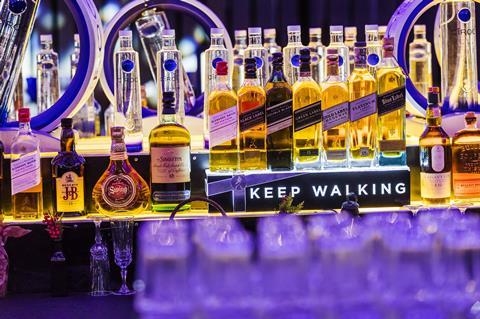City snapshot: Diageo posts organic sales and profit declines amid Americas weakness | News

Top story
Spirits giant Diageo has posted a decline in organic sales and profits as a heavy sales fall in Latin America and the Caribbean hit annual performance.
Releasing its full-year results for the year to 30 June, the Guinness owner said reported net sales organic sales declined by $129m, or 0.6%, as volumes fell back.
Volumes were down by 3.5%, primarily driven by a 21.1% decline in its Latin America and Caribbean region.
That volume decline was partly mitigated by a 2.9% rise in price/mix.
Reported net sales were down 1.4% to $20.3bn due to an unfavourable foreign exchange impact and the organic net sales decline, partially offset by hyperinflation adjustments.
Organic operating profit declined by $304m or 4.8%, of which $302m was attributable to LAC issues.
Reported operating profit grew 8.2% primarily due to the positive impact of exceptional operating items.
Excluding the impact of LAC organic net sales grew $330m or 1.8%, driven by price/mix of 3.9ppts, partially offset by a 2.1% volume decline.
A decrease in organic net sales in North America of 2.5% was offset by growth in Africa, Asia Pacific and Europe.
Despite the weaker organic profit numbers, Diageo will increase its recommended full year dividend by 5% to 103.48 cents per share.
CEO Debra Crew said: “While fiscal 24 was a challenging year for both our industry and Diageo with continued macroeconomic and geopolitical volatility, we focused on taking the actions needed to ensure Diageo is well-positioned for growth as the consumer environment improves.
“Fiscal 24 was impacted by materially weaker performance in LAC. Excluding LAC, organic net sales grew 1.8%, driven by resilient growth in our Africa, Asia Pacific and Europe regions. This offset the decline in North America, which was attributable to a cautious consumer environment and the impact of lapping inventory replenishment in the prior year.
“In fiscal 24 we made good progress against our strategic priorities… We have taken actions to manage the inventory issues in LAC; we have strengthened our consumer insights and redeployed resources towards the best growth opportunities; we have stepped up our route-to-market across several markets, including our most significant transformation in at least a decade in our US Spirits organisation; we have delivered record productivity savings of nearly $700m.
“We are confident that when the consumer environment improves, the actions we are taking will return us to growth.
“Diageo is a resilient business, benefitting from its global reach and unrivalled brand portfolio. With iconic brands that have been enjoyed for decades, Diageo takes a long-term view, and will continue to invest in our brands, people and diversified footprint to deliver sustainable long-term growth and generate shareholder value.”
Morning update
Greggs has posted double-digit sales and profit growth in the first half as it continues to rapidly grow its store estate.
The food-to-go stalwart’s total first-half sales were up 13.8%, with company-managed shop like-for-like sales up 7.4%
Growth was underpinned by 99 new shops opened in the period, including 30 relocations, while 18 closures (excluding relocations) gave it 51 net new shops in the period.
Its strong store opening pipeline and remain on track to achieve 140 to 160 net new shop openings in 2024, with openings are typically weighted to the second half.
The group had 2,524 shops trading as at 29 June 2024
Like-for-like growth was supported by menu development, including the rollout of its over-ice drinks range and dedicated pizza deals.
Additionally, evening sales are growing ahead of the average growth rates, albeit from a low base, while sales through delivery channels grew to 6.7% from 5.3%.
Underlying profit before tax, excluding exceptional items, was up 16.3% to £74.1m.
The group continues to invest in its supply chain, with the redevelopment of its Birmingham and Amersbury centres on track to complete in the second half of 2024, the manufacturing and Logistics site in Derby “progressing well” for its 2026 opening and contracts exchanges for a national distribution centre in Kettering.
CEO Roisin Currie commented: “Greggs has made good progress in the first half of the year, further broadening our range of on-the-go food and drink whilst making it more accessible to more customers. Our success is founded on the exceptional value that Greggs offers to customers looking for food and drink on-the-go and the fast and friendly service delivered by our colleagues.
“Our cost outlook for 2024 remains unchanged and we continue to trade in line with our plan. The Board remains confident in the long-term growth strategy, and we are investing to support that growth.”
Elsewhere this morning, shop price inflation remained at its lowest rate for almost three years in July, according to the BRC-NielsenIQ Shop Price Index.
Shop Price annual inflation remained unchanged at 0.2% in July, which is its lowest rate since October 2021.
Non-food remained in deflation at -0.9% in July, up from -1.0% in the preceding month.
Food inflation slowed to 2.3% in July, down from 2.5% in June. The annual rate continues to ease in this category and inflation is at its lowest rate since December 2021.
Fresh food inflation slowed further in July, to 1.4%, down from 1.5% in June, now its lowest rate since November 2021.
Ambient food inflation decelerated to 3.6% in July, down from 3.9% in June and is the lowest rate since April 2022.
BRC CEO Helen Dickinson said: “The 2023 declines in global food commodity prices continued to feed through, helping bring down food inflation rates over the first seven months of 2024. However this shows signs of reversing, suggesting renewed pressure on food prices in the future. Sports gatherings for Wimbledon and the Euros benefited from discounted snacking items such as crisps and soft drinks.
“UK households suffered from high levels of inflation in 2022 and 2023 and can celebrate inflation levels returning to normal over the first half of this year. But, with the outlook for commodity prices remaining uncertain due to the impact of climate change on harvests domestically and globally, as well as rising geopolitical tensions, renewed inflationary pressures could be lurking just over the horizon.”
Mike Watkins, head of retailer and business insight, NielsenIQ, said: “As we cycle through high inflation comparatives from a year ago we can expect a lower level of inflation for a number of months to come. But with the squeeze on household finances continuing, consumer confidence only slowly improving, and poor summer weather so far, retailers will still need to keep any price increases to a minimum to encourage shoppers to spend.”
Finally this morning, AG Barr has said it will post first half revenue growth of 5% driven by solid growth in its core brands.
The Irn-Bru maker said revenue for six months to 27 July is expected to be £221m, up from £210.4m.
This is primarily driven by soft drinks, which were up 7% as category performance was led by Rubicon where successful marketing and further distribution gains drove double digit revenue growth.
Revenue from Irn-Bru was also up through a combination of volume and value growth and continued market share gains in England. The focus for Boost this year is on margin build and insourcing of the operation and this continues on plan, it said.
The Funkin ready-to-drink business continued to grow at pace, but strong off-trade growth was impacted by short term issues with third party can production and the ongoing challenges in the hospitality sector where late night venues remain particularly affected.
Moma maintained its growth in the first half with new distribution gains.
The group said half-year trading performance was in line with expectations.
It said it remained committed to improving profit margins which, combined with the forecast revenue growth, will lead to positive earnings momentum for H2 and beyond.
CEO Euan Sutherland commented: “I am pleased to report overall H1 revenue growth of c.5% with Soft Drinks growth of c.7%, against strong prior year comparatives. The strategic margin rebuild programmes are on plan, guidance on revenue and margin remains unchanged, and we are on track to meet FY expectations*.
“Our four power brands – Irn-Bru, Rubicon, Boost and Funkin – have clear paths to long-term growth, supported by strong innovation programmes across all of our portfolio and opportunities to work even more closely to add value to our customers, in all channels.
“We continue to invest in our supply chain which will deliver tangible benefits as we insource more of our volume, build capacity to support our growth plans, improve resilience and enhance our margins.
“We have a clear and focused UK based growth strategy with simple KPIs of net revenue, operating margin and ROCE.”
On the markets this morning, the FTSE 100 has opened down 0.5% to 8,252.6pts.
Early risers include Greggs, up 3.7% to 3,044p, Hilton Food Group, up 1.9% to 932p and Reckitt Benckiser, up 1.8% to 4,167p.
Fallers include Diageo, down 9.3% to 2,310p, Ocado, down 6.2% to 405.8p and Naked Wines, down 3.3% to 57.5p.
Yesterday in the City
The FTSE 100 opened the week edging up 0.8% to 8,292.3pts despite Chancellor Rachel Reeves warning about a £22bn black hole in government finances yesterday.















































